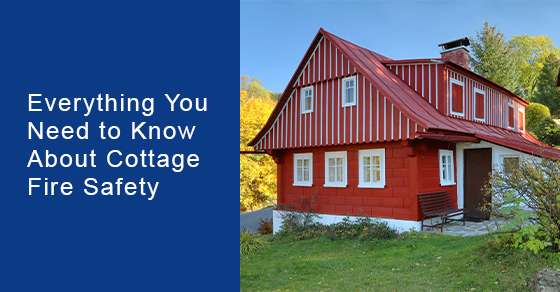Everything You Need to Know About Cottage Fire Safety
Spending time at the cottage should be filled with fun and very little worries. However, there are some risks you can encounter at the cottage, especially if you have a fireplace or fire pit. Even an outdoor fire pit where you enjoy making s’mores can prove to be dangerous if you don’t pay attention to fire safety. Here we provide everything you need to know about cottage fire safety indoors and out.
Smoke Alarms
Many cottagers forget about the importance of smoke alarms at the cottage. However, Ontario’s Fire Code requires them, with one on each floor and outside areas where people sleep. Make sure you test your smoke alarms often and also replace the batteries at least every season. Fire alarms should be replaced at least every eight years. To be extra safe, you should also have a carbon-monoxide detector especially if your cottage uses wood-burning appliances like a woodstove or you have a garage attached to the cottage.
Have a Fire Escape Plan
Since there are many different fire risks when outside the city, you want to have a fire escape plan in place. Every family member should understand the plan. One of the most important aspects of the escape plan is to ensure guests to the cottage as well as people who can’t get out of the cottage on their own have a designated family member to assist them in case of fire. And don’t forget your pets! Keep your keys and cellphone in your room when you sleep in case you have to leave quickly due to a forest fire. This will also make it easier to call 911. Have a designated meeting place on the property so you can make sure everyone is accounted for. Share the escape plan with guests.
Chimney and Appliance Maintenance
Arrange for a professional chimney cleaning when you
open the cottage. This will ensure everything is in working order while removing dangerous debris that can lead to fires, from fallen branches to nests, and a buildup of highly flammable creosote to jams in the flue. If you have fuel-burning appliances, arrange for annual maintenance checks when you open the cottage.
Share All Exit Locations
Although some cottages are quite small and have just a few exits, it’s important to ensure everyone at the cottage knows where the exits are located. Multi-story cottages with various walkouts and decks can be confusing during a fire. If everyone knows where the exits are, they will be better prepared in the event of a fire to choose not only their nearest exit but the safest exit, depending on the location of the fire and other related hazards.
Keep Exits Clear
Always make sure the exits are clear. This includes people leaning bikes against doorways or piling up things like life vests that can cause tripping hazards. Every door should be easy to open and exit from in the case of an emergency.
Install Fire Extinguishers
You should have a fire extinguisher in the kitchen, garage and boathouse, as well as in powerboats. However, it is also important that everyone knows how to use them. Read the manufacturer’s instructions so you know how they work and also know when you should replace them. Never fight a fire if it means you will trap yourself inside. Always make sure you can back out of the room for a safe escape.
Keep Your Cottage Entry Visible
While one of the joys of cottage country is maintaining your privacy, make sure fire vehicles can find you during an emergency. Clearly mark your lane with your address, cottage name, or family name so they can easily identify your location even at night.
Dispose of Ashes Properly
Make sure you dispose of ashes in your wood-burning appliances by either putting them in a steel bucket filled with sand or in mineral soil. Plus, these buckets will get hot, so don’t place them on or near wood surfaces as they can actually start a fire. The safest thing to do is to douse the ashes in the bucket with water to make sure nothing is left burning.
Store Combustibles Safely
All fuels, firewood and other combustibles, such as deck treatments, should be stored at least 10 metres away from your cottage.
Pay Attention to Your Roof
With so much dry, falling debris in cottage country, you should be paying attention to your roof including the rain gutters and chimney(s). You want to keep them as clear as possible of anything that can encourage a fire to spark such as dry leaves, pinecones and needles, branches and old nests. You might want to consider installing gutter protectors and definitely a screened cap on your chimney to reduce risk.
Be Prepared at Bonfires
When enjoying a bonfire be sure you have something handy in case the fire blazes out of control. This can include a bucket of sand or water but also have the garden hose ready. If you have a good sandy base around the pit, a shovel can work well as you can just douse the fire with the sand. Be sure to place your fire pit as far away from surrounding bush and trees as possible, preferably in a clearing or on a beach to reduce the risk of starting a forest fire.
Clean Your Barbecue
Barbecues can catch fire fast thanks to the mix of heat and grease. Be sure to clean your barbecue after each use to reduce the risk of fires. Keep a spray bottle handy while you cook to spritz large flames.
Watch Smokers
If you allow smoking at your cottage, provide a can filled with sand for cigarette butts. Make it clear where people are allowed to smoke and that it is forbidden to toss butts anywhere other than the can. If you would like more information about
cottage insurance, call Oegema Nicholson at 613-704-7766 or
contact us here

